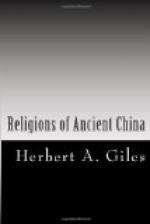Lao Tzu.—Meanwhile, other influences had been helping to divert the attention of the Chinese people from the simple worship of God and of the powers of nature. The philosophy associated with the name of Lao Tzu, who lived nobody knows when,—probably about B.C. 600—which is popularly known as Taoism, from Tao, the omnipresent, omnipotent, and unthinkable principle on which it is based, operated with Confucianism, though in an opposite direction, in dislimning the old faith while putting nothing satisfactory in its place. Confucianism, with its shadowy monotheistic background, was at any rate a practical system for everyday use, and it may be said to contain all the great ethical truths to be found in the teachings of Christ. Lao Tzu harped upon a doctrine of Inaction, by virtue of which all things were to be accomplished,—a perpetual accommodation of self to one’s surroundings, with the minimum of effort, all progress being spontaneous and in the line of least resistance. Such a system was naturally far better fitted for the study, where in fact it has always remained, than for use in ordinary life.
In one of the few genuine utterances of Lao Tzu which have survived the wreck of time, we find an allusion to a spiritual world. Unfortunately, it is impossible to say exactly what the passage means. According to Han Fei (died B.C. 233), who wrote several chapters to elucidate the sayings of Lao Tzu, the following is the correct interpretation:—
“Govern a great nation as you would cook a small fish (i.e. do not overdo it).
“If the empire is governed according to Tao, evil spirits will not be worshipped as good ones.
“If evil spirits are not worshipped as good ones, good ones will do no injury. Neither will the Sages injure the people. Each will not injure the other. And if neither injures the other, then there will be mutual profit.”
The latter portion is explained by another commentator as follows:—
“Spirits do not hurt the natural. If people are natural, spirits have no means of manifesting themselves; and if spirits do not manifest themselves, we are not conscious of their existence as such. Likewise, if we are not conscious of the existence of spirits as such, we must be equally unconscious of the existence of inspired teachers as such; and to be unconscious of the existence of spirits and of inspired teachers is the very essence of Tao.”
Adumbrations of Heracleitus.—In the hands of Lao Tzu’s more immediate followers, Tao became the Absolute, the First Cause, and finally One in whose obliterating unity all seemingly opposed conditions of time and space were indistinguishably blended. This One, the source of human life, was placed beyond the limits of our visible universe; and in order for human life to return thither at death and to enjoy immortality, it was only necessary to refine away corporeal grossness according to the doctrines of Lao Tzu. Later on, this One came to be regarded as a fixed point of dazzling luminosity, in remote ether, around which circled for ever and ever, in the supremest glory of motion, the souls of those who had successfully passed through the ordeal of life, and who had left the slough of humanity behind them.




